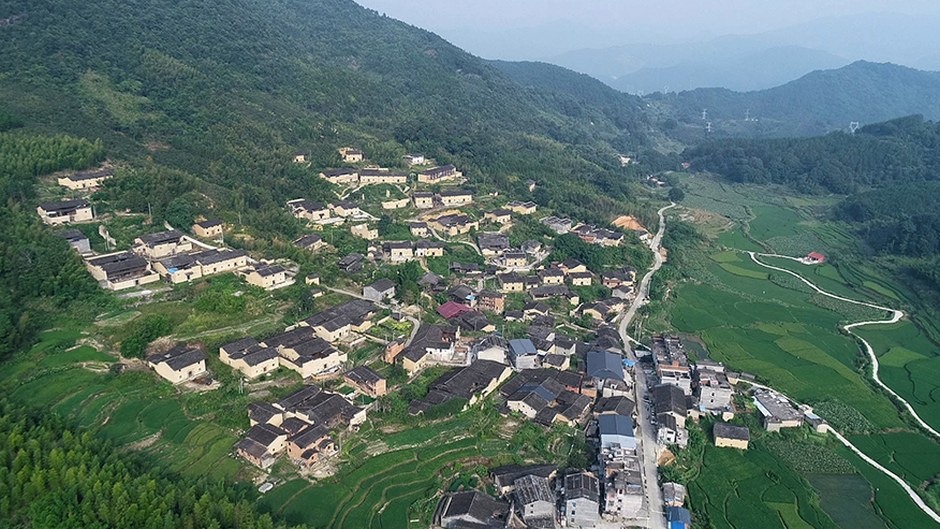10 Dec 2018
For the past several decades, time in Jukou County, Fujian province, had been at a standstill. Traditional villages had preserved their natural settlements, retained their architecture, and maintained their traditional ways of living.

Over the past decade, many villages fell into decay as the younger generation moved away to look for a better life in cities.
Today, this is starting to change.
In 2015, a new high-speed train route launched crossing the county. Suddenly, the once far away villages of Jukou County find themselves a short train ride from the city of Fuzhou, and only a few hours from Shanghai. With this new accessibility, the time has come for the declining villages to face the future.

Students and staff from Xi’an Jiaotong-Liverpool University travelled to Fujian province to participate in an interdisciplinary workshop on the revitalisation of traditional rural villages.
Over four days, the students and their tutors brainstormed creative ideas and developed solutions for sustainable revival.
Risks and opportunities
Among the rice fields, rolling mountains and lush vegetation, Jukou County is home to impressive scenery, heritage and culture. As the villages become more accessible, there is a chance for revitalisation. There is also an opportunity to improve the local economy.
But as any place opening to the world, there is a risk of losing just what makes it so unique.
“As seen in many village restoration projects in China, there is always a risk of perverting heritage and tradition through ‘Disneyfication’,” said Dr Yiping Dong from the Department of Architecture at XJTLU.
“In addition, the stunning natural beauty of the surrounding landscape is under threat from unsustainable building and usage,” she said.
XJTLU research and creative workshop
Within this context, XJTLU students under the leadership of Dr Dong have been collaborating with local institutions to brainstorm ideas for the future of Jukou County.

During the summer, participants in a Summer Undergraduate Research Fellowships project developed precise documentation of traditional housing typologies and construction techniques from five villages in the county.
The project won top prizes at the SURF Poster Day earlier this semester.
Building upon the SURF project research, an interdisciplinary workshop organised by the Departments of Architecture and Urban Planning and Design was held from November 1-4 to come up with creative solutions for revitalising the area.
Four tutors - Dr Dong, Richard Hay, Dr Christian Nolf, and Dr Claudia Westermann – accompanied 19 students from different disciplines: architecture, planning, industrial design and film.
Over the four days, the team worked in three villages - Beikeng, Jiulong and Shangpu.
Art-led revitalisation
The organisation of the workshop coincided with Jiulong village’s first International Art Harvest Festival.
This event, which drew hundreds of people on its opening day, invited international artists to design installations throughout the rural landscape and transform the village into a temporary creative art space.



“The festival was an incredible inspiration for the villagers, as well as for XJTLU students,” said Dr Christian Nolf.
“It not only encouraged new ways to interact with the village space, combining the old and the new, it also provided a platform to revitalise the perception of Jiulong and its residents’ civic pride,” he said.
"The rural future must not wipe out the past"
Three teams of students worked on three different villages over the course of the four-day workshop.
“There was much to draw inspiration from: the surrounding landscape, the preserved traditions and heritage of the villages, the architecture, the customs and culture, but also the contemporary art projects of the Art Harvest Festival,” said Dr Claudia Westermann.
On the fourth day, the students presented their ideas in the Jiulong municipal hall, sharing their ideas with a panel of villagers, local leaders, and academic experts in rural planning and heritage conservation.


The solutions proposed by the students included: integrating the villages as part of one network for ‘slow tourism’; incorporating technology for sustainable development; repurposing old and underused buildings; and revitalising local craft and culture, among others.
“From the enthusiastic discussion that followed the presentations, one thing was clear: the rural future must not wipe out the rural past,” said Dr Dong.
“The tangible and intangible heritage of Jukou County is its main asset, and from it one can imagine new perspectives together with the active involvement of the local people,” she said.

An exhibition, ‘The Summer Diary of Jukou’, presenting the research outcomes of the SURF project and the workshop, was held at the URBANCROSS Gallery, Shanghai.
“The workshop was a new step in the long-term exploration of the rural future in China by XJTLU. More events, research, and workshops are planned to follow,” said Dr Dong.
Story and photos provided by the Departments of Architecture and Urban Planning and Design; edited by Danny Abbasi
10 Dec 2018
RELATED NEWS

Workshop on computer generated imagery for architecture students
Students from the Department of Architecture at Xi’an Jiaotong-Liverpool University enhanced their digital architecture visualisation skills in a workshop de...
Learn more

Examining differing perceptions of Chinese architecture
A workshop, ‘Mapping Architectural Criticism in China’, took place at Xi’an Jiaotong-Liverpool University, inviting researchers in different fields to assess...
Learn more








